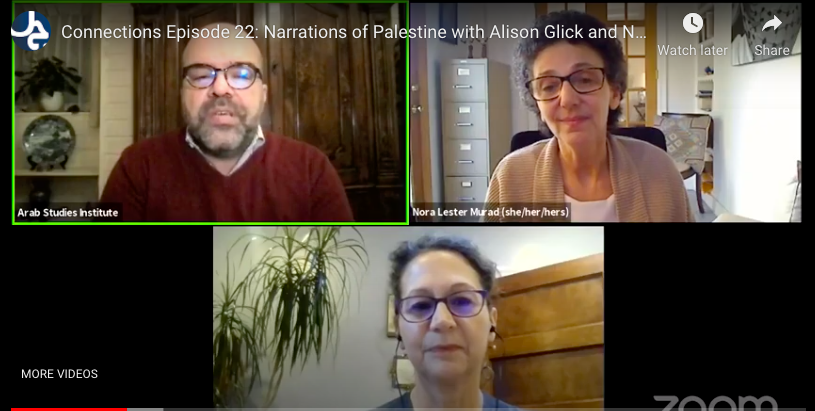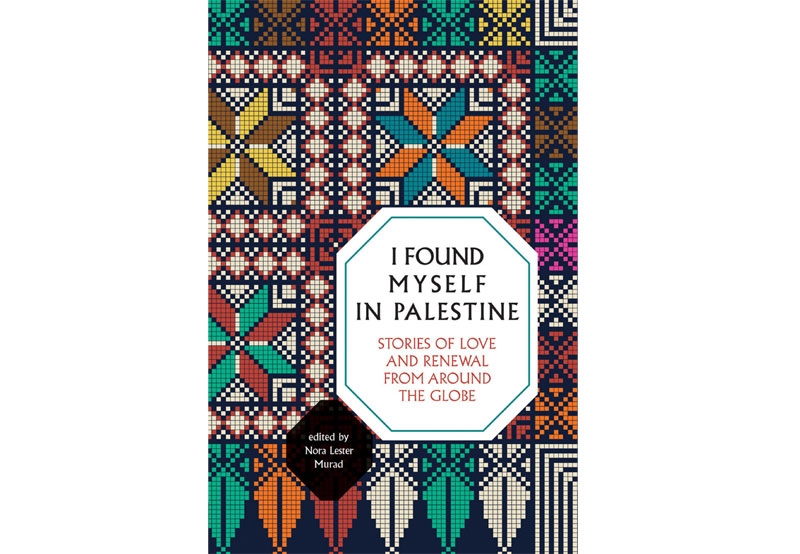
This 50-minute conversation, recorded on November 9, 2021, covers how Allison and I “found” Palestine, what it has meant to us as “foreigners” and Jews, and how we wish to contribute to social justice through our fiction writing.
This review originally appeared in Al-Akhbar.
نورا لستر مراد محرّرة كتاب «وإذ بي في فلسطين» (منشورات أوليف برانش ــ 2020) الفريد كتبت: «لقد تبلورت فكرة هذا المؤلف أثناء تناول فنجان من القهوة في رام الله، وعملية إتمامه لم تكن علمية أو صارمة. لقد تواصلت مع أشخاص من مختلف أنحاء العالم متزوجين من فلسطينيين، أو عاشوا في فلسطين لفترة طويلة، أو لديهم خبرة طويلة وعميقة في ما يتعلق بفلسطين، فوجدت نفسي أبحث عن نوع معين من «الأجانب»، النوع الذي يدرك أنه في ظن العديد من الفلسطينيين يعني «الذين يستفيدون من معاناتهم». أشير إلى هؤلاء المتخصصين في المساعدة الدولية والدبلوماسيين الذين تحركهم الاهتمامات المهنية أكثر من التضامن. إنهم يثيرون غضب الفلسطينيين. لكني أردت في المقابل تسليط الضوء على قصص الأجانب الذين عملوا بجدّ وبتواضع وصدق لأجل الفلسطينيين ومعهم. هم نوع مختلف من الأجانب الذين يمكن أن يصبحوا جزءاً من المجتمع الفلسطيني ويتغيرون بواسطته. بعض من دعوته اعتذر عن عدم المشاركة وقال: على الفلسطينيين التحدث عن أنفسهم، لكنهم ساعدوا باعتذارهم هذا في تشكيل رؤية المشروع واتجاهه. «وإذ بي في فلسطين» ليس مؤلفاً عن فلسطين، وإنما مجموعة من تأملات غير فلسطينيين تعتبر قصصهم أيضاً هدية من هذا المكان».

وجهات النظر الـ 22 الممثلة في هذا المؤلف تعكس آراء كُتَّابها، وهي مجموعة معبرة وغنية بالمعلومات ومأساوية ومناصرة ومدهشة وعالمية، لكنها لا تستطيع أبداً رسم صورة كاملة. تجارب الأجانب تتغير باستمرار، والمحررة نورا مراد تقول: «لا أستطيع أن أتخيل فلسطينياً يقول اليوم: إن الإغلاق أو حظر التجول هو خطئي لأنني أميركية، مع أنه بالتأكيد أكثر صحة اليوم مما كان عليه في أي وقت مضى. لقد عانى الفلسطينيون عقوداً من الاستهداف على أيدي الأجانب، لكنهم شهدوا أيضاً عقوداً من التضامن». «وإذ بي في فلسطين» مجموعة من الروايات من مختلف القارات التي تستكشف مفهوم كونك أجنبياً في ما يتعلق بفلسطين، جنباً إلى جنب مع الشعب الفلسطيني الذي يتم تصويره على أنه أجنبي في أرضه. بالنسبة إلى الفلسطينيين، للغربة معانٍ مختلفة. المستوطنون هم الأجانب الذين يشاركون في سرقة فلسطين ويجعلون الفلسطينيين أجانب من خلال التهجير. هناك أيضاً الأجانب الذين يتعاملون مع الشعب الفلسطيني، وكذلك «الأجانب المحترفون الذين يأتون إلى هنا ويبنون وظائف على حساب نضالنا».
يجمع المؤلف مجموعة من القصص من أشخاص تتشابك حياتهم مع حياة الشعب الفلسطيني بطرق مختلفة. ومحررته، نورا لستر مراد، وهي أميركية متزوجة من فلسطيني، كتبت في مقدمتها «الفلسطينيون مجتمع منفي، لكن الكُتَّاب الذين ظهروا في هذه المجموعة ليسوا كذلك»، وتشرح كيف بيّنت مجموعة الروايات المباشرة عن الأجانب للفلسطينيين «ليصبحوا جزءاً من المجتمع الفلسطيني ويتغيروا بواسطته».
قصص الأجانب الذين عملوا بجدّ وبتواضع وصدق لأجل الفلسطينيين ومعهم
تم سرد تجارب مختلفة في هذا المؤلف. يعتزّ البعض بالتقاليد والالتزامات الاجتماعية للانضمام إلى عائلة فلسطينية. بالنسبة إلى الأجانب الآخرين الذين يتزوجون من عائلات فلسطينية، يُنظر إلى التقاليد على أنها خانقة ومتناقضة مع ثقافة وطن الآخر. على سبيل المثال، تقول البوليفية كورينا ماماني، التي تعيش في فلسطين منذ 25 عاماً: ترتبط التقاليد والثقافة بالضغط الاجتماعي. لكن سميرة الصفدي، وهي ألمانية من أصل فلسطيني، تتماهى مع فلسطين وكونها فلسطينية على مدى فترة طويلة من الزمن. «لا أستطيع أن أقول إنني فلسطينية عندما لا أشعر أنني كذلك». بالنسبة لها، لم تكن الثقافة الموروثة هي التي روّجت للهوية، بل بالأحرى تجربتها في العيش في فلسطين والاجترار حول هذه الفترة بعيداً عن فلسطين في بلغاريا. «العيش في فلسطين له معنى الآن. إنه يعني صموداً ومقاومة».
تجربة معاكسة تماماً لتجربة فلسطين من المنفى قدمتها الفلسطينية التشيلية نادية حسن، التي شكل سعيها للعودة إلى وطنها بعد تجربة في الجامعة معنى لمفهوم «العودة». بعد العديد من المحن، تمكنت من جعل
فلسطين منزلها.
في أوقات أخرى، تؤكّد العادات والتوقعات المجتمعية الفلسطينية الغربة، كما في حالة زينة، وهي امرأة سودانية متزوجة من أرمل من الولايات المتحدة. تقول عن دورها المهني في عيادة السرطان: «إنهم يرون في
مقدمة رعاية، وامرأة، وأم أخرى تشعر بألمهم».
بالنسبة للأشخاص الذين لم تطأ أقدامهم فلسطين أبداً، والذين تعتمد معرفتهم أساساً على الأخبار والتحليلات، فمن السهل بناء مفهوم محدود عن الفلسطينيين وماهية فلسطين. من خلال روايات مثل هذه، أصبحت إنسانية السكان المستعمَرين ملموسة، ولم يعد يُنظر إلى الفلسطينيين على أنهم بند في الأخبار أو جدول الأعمال الدبلوماسي فقط.
This interview first appeared in The Muslim Vibe.
What we know of Palestine can be traced directly to media reports, but how much of that knowledge is traced back to the Palestinian people themselves?
In recent years there has been a renewed emphasis on the importance of communicating Palestinian narratives, many of which have been silenced. The international community has long forced its own constructions of what Palestine is and who Palestinians are, eliminating the voices of Palestinians in the process unless these serve to substantiate a diplomacy that has enabled Israeli colonisation. Gradually, the world normalised the international community’s version of Palestine and paid less heed to the Palestinians themselves.
The recent drive to push Palestinian narratives to the helm has shifted perceptions. Palestinian refugees, for example, are no longer only perceived as part of the humanitarian paradigm but as individuals, and also a collective, who were active participants in their own history.
To heighten awareness about Palestinian narratives, the fine line between speaking for Palestinians and creating the space for Palestinian voices to be heard needed to be drawn. Equally important, what is the role of non-Palestinians with regard to Palestine?
Nora Lester Murad’s books, “Rest in My Shade” and “I Found Myself in Palestine”, both published by Interlink Books, are examples of a non-Palestinian imparting Palestine to an international audience. Speaking to The Muslim Vibe, she discusses her positioning, understanding, empathy, and affinity with Palestine, and how these have impacted her writing about the land and the people.
Ramona Wadi: Can you speak about your experience in Palestine and how much of a role did affinity play in the publication of your two books, ‘Rest In My Shade’ and ‘I Found Myself In Palestine’?
Nora Lester Murad: My relationship with Palestine goes back almost 40 years. Finding myself in the Middle East in 1982 was a fluke. I didn’t know anything about a conflict, but people kept pushing me to take sides. As a Jew, I felt complicit, but I was too ignorant to contribute to a solution. I committed to learning about Palestinian history and culture assuming that it would be difficult for me to relate to. But it was not difficult at all.
My first Palestinian friendships formed while I was studying abroad in Cairo and Jerusalem. I married my Muslim Palestinian husband in 1989. I worked as an organiser for Palestinian rights and incorporated Palestine liberation into my antiracism work in the US. Since I developed my political and social consciousness in relation to Palestine (among other issues), if you took Palestine away from me, there would be a massive hole.
Being a mother to three Palestinian-American girls who we raised in the West Bank entrenches me in an even deeper way. I think that co-writing “Rest in My Shade” and editing “I Found Myself in Palestine” (and two novels that are yet unpublished) helped me to bridge the gaps between who I was born and who I have become. Writing also helps me fulfill an obligation I feel to bring Westerners/English readers closer to understanding Palestine on its own terms and not through the lens of a distorted Zionist narrative.
“Rest In My Shade” evokes the ongoing Palestinian trauma. Can you elaborate upon this expression and experience from your observations?
I’m not sure I’ve ever met a Palestinian who didn’t have loss and displacement central in their sense of self. Many carry trauma from the past and ongoing oppression and fragmentation of their people into their daily lives. Innumerable times I have been advised by Palestinian friends not to hope too much, not to try too hard, not to care so deeply — because I would inevitably be disappointed.
They grew up with a lived understanding of the injustices of the world that I only learned as I grew older. But at the same time, the feeling of not belonging is one that many people can relate to. The theme of “Rest in My Shade” — the yearning for belonging and community — is central to the Palestinian people, but it is not exclusive to them. The process of co-authoring “Rest in My Shade” showed me that while Palestinian experience is particular, there are aspects that can be universally understood.
‘I Found Myself In Palestine’ invokes a more tangible account of life in Palestine from different non-Palestinian perspectives – a human, ordinary, everyday account that is overlooked due to the political implications. How does this contribute for people to understand the political and social context?
“I Found Myself in Palestine” is unique because it is comprised of stories by non-Palestinians who are, nonetheless, members of the Palestinian community. We have an insider-outsider perspective that sheds light beyond what non-Palestinians experience when they connect with Palestine grounded solely in their own national/cultural/historic reference points. We also have perspectives that are distinct from the Palestinians we live among.
The group of 23 writers featured in “I Found Myself in Palestine” didn’t set out to explain Palestine to others. We wrote to understand our own experiences through our writing. For many of us, the process was one of healing from the pain of living between different worlds, not fully a part of any one group. I do hope, though, that reading the pieces helps readers see Palestinians as human beings like any others and to broaden their impression of Palestinians beyond that of characters on a political stage. Humanising Palestinians can’t help but improve people’s support for Palestinian human rights.
As a non-Palestinian writing about Palestine, how is the boundary between narrating Palestine and speaking for Palestinians maintained, to avoid the latter?
There is a huge body of harmful literature by non-Palestinians claiming to speak for Palestinians. I certainly don’t want any of my work to fall into that category. Palestinians can and should speak for themselves — this is at the forefront of my mind whenever I write.
First of all, I make every effort to not misrepresent myself as a Palestinian. I use both my maiden and married names. I try to be explicit that I am writing from my own social location as a white, US, anti-Zionist Jew who is part of a Palestinian family and is a long-time activist for Palestinian rights.
Second, I try to write about my own experiences and opinions. I remind myself that my own experiences and opinions are not more “correct” or valuable than a Palestinian’s, but they are just as legitimate. In other words, I don’t think we need to avoid writing or talking about Palestine. We just need to be careful that we don’t claim to represent Palestinians or imply that our interpretations are more credible than their own self-representation.
At the same time, since Palestinian voices are so often marginalised, we need to be intentional about amplifying Palestinian voices and protecting space for them to speak their own truths without qualification. Mariam Barghouti writes about this eloquently in the foreword to the book.
Nora Lester Murad’s books, “Rest in My Shade” and “I Found Myself in Palestine”, are both published by Interlink Books.
Join me and other Interlink authors Phyllis Bennis and Daphna Levit for a one-hour discussion of our books. Sponsored by the Arab American-Anti-Discrimination Committee (ADC). If the technology doesn’t work correctly, you may wish to try watching it on YouTube at https://www.youtube.com/watch?v=DRpdYrflvdM&feature=youtu.be.